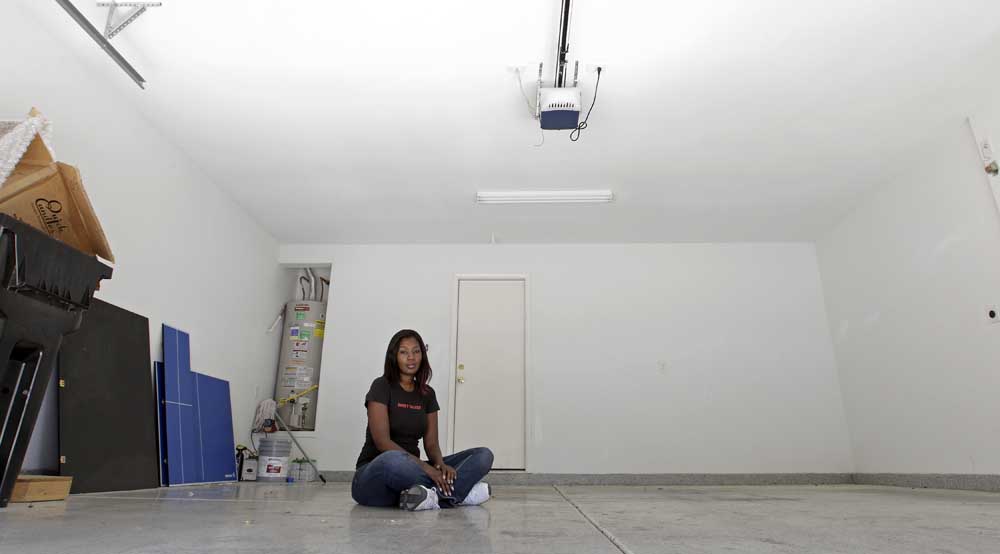Miss a payment? Good luck starting that car
Published 12:00 am Friday, September 26, 2014

- John Gurzinski / The New York TimesT. Candice Smith, who testified to Nevada’s legislature that her car loan lender remotely shut off her car while she was driving on the highway, sits in her empty garage in Las Vegas. Some subprime lenders are using a technology that can track and remotely disable vehicles to force delinquent borrowers to make their car payments.
The thermometer showed a 103.5-degree fever, and her 10-year-old’s asthma was flaring up. Mary Bolender, who lives in Las Vegas, needed to get her daughter to an emergency room, but her 2005 Chrysler van would not start.
The cause was not a mechanical problem — it was her lender.
Trending
Bolender was three days behind on her monthly car payment. Her lender, C.A.G. Acceptance of Mesa, Arizona, remotely activated a device in her car’s dashboard that prevented her car from starting. Before she could get back on the road, she had to pay more than $389, money she did not have that morning in March.
“I felt absolutely helpless,” said Bolender, a single mother who stopped working to care for her daughter. It was not the only time this happened: Her car was shut down that March, once in April and again in June.
This new technology is bringing auto loans — and Wall Street’s version of Big Brother — into the lives of people with credit scores battered by the financial downturn.
Auto loans to borrowers considered subprime — those with credit scores at or below 640 — have spiked in the last five years.
The jump has been driven in large part by the demand among investors for securities backed by the loans, which offer high returns at a time of low interest rates. Roughly 25 percent of all new auto loans made last year were subprime, and the volume of subprime auto loans reached more than $145 billion in the first three months of this year.
But before they can drive off the lot, many subprime borrowers like Bolender must have their car outfitted with a so-called starter interrupt device, which allows lenders to remotely disable the ignition. Using the GPS technology on the devices, the lenders can also track the cars’ location and movements.
Trending
The devices, which have been installed in about 2 million vehicles, are helping feed the subprime boom by enabling more high-risk borrowers to get loans. But there is a big catch. By simply clicking a mouse or tapping a smartphone, lenders retain the ultimate control. Borrowers must stay current with their payments, or lose access to their vehicle.
“I have disabled a car while I was shopping at Walmart,” said Lionel M. Vead Jr., the head of collections at First Castle Federal Credit Union in Covington, Louisiana. Roughly 30 percent of customers with an auto loan at the credit union have starter interrupt devices.
Now used in about one-quarter of subprime auto loans nationwide, the devices are reshaping the dynamics of auto lending by making timely payments as vital to driving a car as gasoline.
‘Degrading’ devices
Seizing on such technological advances, lenders are reaching deeper and deeper into the ranks of Americans on the financial margins, with interest rates on some of the loans exceeding 29 percent. Concerns raised by regulators and some rating firms about loose lending standards have disturbing echoes of the subprime-mortgage crisis. As the ignition devices proliferate, so have complaints from troubled borrowers, many of whom are finding that credit comes at a steep price to their privacy and, at times, their dignity, according to interviews with state and federal regulators, borrowers and consumer lawyers.
Some borrowers say their cars were disabled when they were a few days behind on their payments, leaving them stranded in dangerous neighborhoods. Others said their cars were shut down while idling at stoplights. Some described how they could not take their children to school or to doctor’s appointments. One woman in Nevada said her car was shut down while she was driving on the freeway.
Beyond the ability to disable a vehicle, the devices have tracking capabilities that allow lenders and others to know the movements of borrowers, a major concern for privacy advocates. And the warnings the devices emit — beeps that become more persistent as the due date for the loan payment approaches — are seen by some borrowers as more degrading than helpful.
“No middle-class person would ever be hounded for being a day late,” said Robert Swearingen, a lawyer with Legal Services of Eastern Missouri, in St. Louis. “But for poor people, there is a debt collector right there in the car with them.”
Lenders and manufacturers of the technology say borrowers consent to having these devices installed in their cars. And without them, they say, millions of Americans might not qualify for a car loan at all.
A virtual repo man
From his office outside New Orleans, Vead can monitor the movements of about 880 subprime borrowers on a computerized map that shows the location of their cars with a red marker. Vead can spot drivers who have fallen behind on their payments and remotely disable their vehicles on his computer or mobile phone.
The devices are reshaping how people such as Vead collect on debts. He can quickly locate the collateral without relying on a repo man to track down delinquent borrowers.
Vead says that first, he tries reaching a delinquent borrower on the phone or in person. Then, only after at least 30 days of missed payments, he typically shuts down cars when they are parked at the borrower’s house or workplace. If there is an emergency, he says, he will turn a car back on.
None of the borrowers or consumer lawyers interviewed by The New York Times raised concerns about the way Vead’s credit union uses the devices. But other lenders, they said, were not as considerate, marooning drivers in far-flung places and often giving no notice of a shut-off. Lenders say that they exercise caution when disabling vehicles and that the devices enable them to extend more credit.
Without the use of such devices, said John Pena, general manager of C.A.G. Acceptance, “we would be unable to extend loans because of the high-risk nature of the loans.”
A leading device maker, PassTime of Littleton, Colorado, says its technology has reduced late payments to roughly 7 percent from nearly 29 percent. Spireon, which offers a GPS device called the Talon, has a tool on its website where lenders can calculate their return on capital.
Fears of surveillance
While the devices make life easier for lenders, their ability to track drivers’ movements has struck a nerve with a number of borrowers and some government authorities, who say they are a particularly troubling example of personal data gathering and surveillance.
At its extreme, consumer lawyers say, such surveillance can compromise borrowers’ safety. In Austin, Texas, a large subprime lender used a device to track down and repossess the car of a woman who had fled to a shelter to escape her abusive husband, said her lawyer, Amy Clark Kleinpeter.
The move to the shelter violated a clause in her auto loan contract that restricted her from driving outside a four-county radius, and that prompted the lender to send a tow truck to take back the vehicle. If the lender could so easily locate the client, Kleinpeter said, what was stopping her husband?
“She was terrified her husband would be able to find out where she was from the tow truck company,” said Kleinpeter, a consumer lawyer in Austin, who said a growing number of her clients had the devices installed in their cars.
Lenders and manufacturers emphasize that they have strict guidelines in place to protect drivers’ information. The GPS devices, they say, are predominantly intended to help lenders and car dealerships locate a car if they need to repossess it, not to put borrowers under surveillance.
Spireon says it can help lenders identify signs of trouble by analyzing data on a borrower’s behavior. Lenders using Spireon’s software can create “geo-fences” that alert them if borrowers are no longer traveling to their regular place of employment — a development that could affect a person’s ability to repay the loan.
A Spireon spokeswoman said the company takes privacy seriously and works to ensure that it complies with all state regulations.
Corinne Kirkendall, vice president for compliance and public relations for PassTime, which has sold 1.5 million devices worldwide, says the company also calls lenders “if we see an excessive use” of the tracking device.
Government scrutiny
Across the country, state and federal authorities are grappling with how to regulate the new technology.
Consumer lawyers, including dozens whose clients’ cars have been shut down, argue that the devices amount to “electronic repossession” and their use should be governed by state laws, which outline how much time borrowers have before their cars can be seized.
State laws governing repossession typically prevent lenders from seizing cars until the borrowers are in default, which often means that they have not made their payments for at least 30 days.
The devices, lawyers for borrowers argue, violate those laws because they may effectively repossess the car days after a missed payment. Payment records show that Bolender, the Las Vegas mother with the sick daughter, was not in default in any of the four instances her ignition was disabled this year.
PassTime and the other manufacturers say they ensure that their devices comply with state laws. C.A.G. declined to comment on Bolender’s experiences.
State regulators are also examining whether a defective device could endanger the borrowers or other drivers on the road, according to people with knowledge of the matter who spoke on the condition of anonymity.
Last year, Nevada’s Legislature heard testimony from T. Candice Smith, 31, who said she thought she was going to die when her car suddenly shut down, sending her careening across a three-lane Las Vegas highway.
“It was horrifying,” she recalled.
Smith said that her lender, C.A.G. Acceptance, had remotely activated her ignition interruption device.
“It’s a safety hazard for the driver and for all others on the road,” said her lawyer, Sophia A. Medina, with the Legal Aid Center of Southern Nevada.
Pena of C.A.G. Acceptance said, “It is impossible to cause a vehicle to shut off while it is operating.”
He added, “We take extra precautions to try and work with and be professional with our customers.”
While PassTime, the device’s maker, declined to comment on Smith’s case, the company emphasized that its products were designed to prevent a car from starting, not to shut it down while it was in operation.
“PassTime has no recognition of our devices shutting off a customer while driving,” Kirkendall of PassTime said.
In her testimony, Smith, who reached a confidential settlement with C.A.G., said the device made her feel helpless.
“I felt like even though I made my payments and was never late under my contract, these people could do whatever they wanted,” she testified, “and there was nothing I could do to stop them.”







